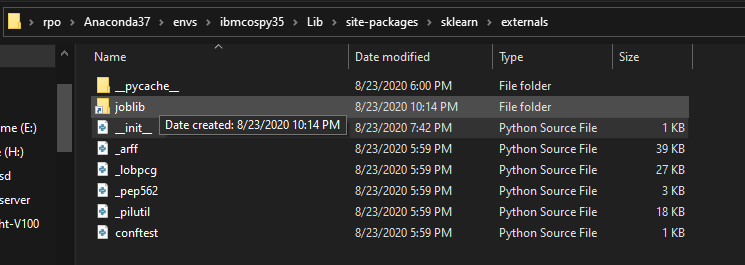I am trying to load my saved model from s3 using joblib
import pandas as pd
import numpy as np
import json
import subprocess
import sqlalchemy
from sklearn.externals import joblib
ENV = 'dev'
model_d2v = load_d2v('model_d2v_version_002', ENV)
def load_d2v(fname, env):
model_name = fname
if env == 'dev':
try:
model=joblib.load(model_name)
except:
s3_base_path='s3://sd-flikku/datalake/doc2vec_model'
path = s3_base_path+'/'+model_name
command = "aws s3 cp {} {}".format(path,model_name).split()
print('loading...'+model_name)
subprocess.call(command)
model=joblib.load(model_name)
else:
s3_base_path='s3://sd-flikku/datalake/doc2vec_model'
path = s3_base_path+'/'+model_name
command = "aws s3 cp {} {}".format(path,model_name).split()
print('loading...'+model_name)
subprocess.call(command)
model=joblib.load(model_name)
return model
But I get this error:
from sklearn.externals import joblib
ImportError: cannot import name 'joblib' from 'sklearn.externals' (C:\Users\prane\AppData\Local\Programs\Python\Python37\lib\site-packages\sklearn\externals\__init__.py)
Then I tried installing joblib directly by doing
import joblib
but it gave me this error
Traceback (most recent call last):
File "<stdin>", line 1, in <module>
File "<stdin>", line 8, in load_d2v_from_s3
File "/home/ec2-user/.local/lib/python3.7/site-packages/joblib/numpy_pickle.py", line 585, in load
obj = _unpickle(fobj, filename, mmap_mode)
File "/home/ec2-user/.local/lib/python3.7/site-packages/joblib/numpy_pickle.py", line 504, in _unpickle
obj = unpickler.load()
File "/usr/lib64/python3.7/pickle.py", line 1088, in load
dispatch[key[0]](self)
File "/usr/lib64/python3.7/pickle.py", line 1376, in load_global
klass = self.find_class(module, name)
File "/usr/lib64/python3.7/pickle.py", line 1426, in find_class
__import__(module, level=0)
ModuleNotFoundError: No module named 'sklearn.externals.joblib'
Can you tell me how to solve this?

